This is a transcript for my podcast. If you want to listen instead of reading tiresome words, you can go here to listen through the browser. If you'd like to find it on iTunes to subscribe and get future episodes automatically, you can go here.
Have a correction or request for a future episode? Connect with me on twitter.
Episode 3B
This week on the Myths and Legends Podcast, you'll get more tips on how to raise a legendary Nordic child, which includes, but is not limited to, turning him into a werewolf. Also, we'll see the effectiveness of filtering toxins from ale with your mustache and learn that there's no such thing as too much revenge. For the creature of the week, it's a super pleasant waterfall-dweller who'll to teach you how to play the fiddle - you just have to bring your goat.
This is the Myths and Legends Podcast, Episode 3B: All That Hate's Gonna Burn You Up
My wife and I moved recently, so this is now coming to you from the new world headquarters of the Myths and Legends podcast in upstate New York. With all the preparations, I didn’t have time for an episode last week. We’re still getting settled, and moving isn’t conducive to writing and recording podcasts, so the episodes might not be super consistent for the next couple of weeks, but they are coming. Thanks for sticking with me.
Also, a huge thanks to Dboy89 for our first review on iTunes. That’s his name on there – I have no idea who he is really. That’s the only one I can see, at least. I know Apple banks a number of reviews before publishing them, so thank you if you’ve reviewed it and I just can’t see it. If you want to write one, I’ll totally mention your name on the show. So thanks again to anyone who’s reviewed it so far.
Previously
Previously on the podcast, we followed an ill-fated Norse family as they rose to power. The patriarch, King Volsung, was betrayed by his son in law, king Siggeir on a visit, and all but one son died. Sigmund, the son who lived, made his way off into the forest and plotted revenge on king Siggeir. Queen Signy, Volsung's daughter, conspired with her brother, and after a few failed attempts, realized that Sigmund needed a true Volsung child to help avenge their father. She deceived him into thinking she was someone else and became pregnant with their son.
Part one: Wolves and Woods
She gave birth to Sinfjötli, who grew up strong and tall despite that really being genetically unlikely. After losing the first two, she had taken to testing her sons in a different way to see if they were ready to join Sigmund. She would stitch their tunics while the boys were wearing them, and then began stitching them to the boys' wrists. All she and king Siggeirs kids wailed at the completely reasonable point, where she started poking a needle in their skin. Sinfjötli, though, didn't even flinch. She sewed both collars, and got no response. She then took the shirt off the boy, tearing skin from his wrists, and mentioned how that should have really hurt him. He scoffed and said that the pain is nothing for a true Volsung. This ritualistic child abuse apparently served its purpose, and she sent the boy to her brother in the forest.
That night Sigmund tried the same bread making test he had with the other children, and came back to find the dough rising near the fire. He smiled, and asked the boy what had happened. Sinfjötli replied that he started working with the flour, and thought that there was something alive when he was kneading the dough, but he kept kneading and whatever was alive in there was definitely dead now.
Sigmund said two things: 1: that's great, you're obviously a true Volsung and two, you really shouldn't eat that bread because that living thing was an extremely poisonous snake. He took the boy in as his ward.
It's said that during the summers the men would roam the forest, killing men for plunder. There are two ways to look at this. One is that they just turn into common brigands and bandits, killing for fun and profit, and to train up Sinfjötli. The second is them waging a guerrilla war in a foreign land. Remember that Volsung was in king Siggeir's land when he died, so they are still in the enemy king's forest. Granted, Sigmund killed children in the last story, clearly crossing the moral event horizon, so I shouldn't try to rationalize their behavior. In all likelihood they were just acting like common thieves, killing people to get gold and train up Sinfjötli.
Sigmund marveled at the boy, and couldn't believe he was the son of king Siggeir. Not only did he have the power, energy, and fearlessness of a Volsung, but he reminded Sigmund constantly of his duty to avenge his father and kill king Siggeir.
Werewolves
They do this for a time until they chance upon a cabin with men sleeping inside. They almost kill and rob these men when they see wolf skins hanging above their bed. Both men probably think how cool it would look to murder while wearing the skins, and put them on. That's what saves the lives of the men, because As soon as the skins are on, they feel the transformation.
Yep, they're werewolves now. This feral panic takes over and they run out of the cabin into the forest. The get their wits about them enough to communicate, and agree that they are going to go try to fight some guys to try out these new powers. They agree they won't fight more than the arbitrarily-chosen seven men at a time, though. If one got into a bad spot, he would howl and the other would come help immediately.
As an aside, this is an early example of a berserker. A berserker was an uncontrollable legendary Norse warrior who would go into battle wearing animal skins, usually bears, and just go into an uncontrollable battle frenzy. People believed wearing the skins would help them channel the animal itself. The word "berserker" comes from two Old Norse words, "ber" meaning "bear" and "serkr" meaning "shirt" or "coat," so berserker actually means bear-shirt.
The two Volsungs separated, and Sigmund chances upon seven men, and is quickly over-matched. He howls, and Sinfjötli rushes in and they defeat the men. They separate again, and Sinfjötli found eleven men, and decided to test his mettle and take them all himself. It's a long fight, and at the end Sinfjötli is victorious, though badly wounded. He slumps next to an oak tree and watches the thirsty ground drink up his blood.
Uncle/father Sigmund comes and see his ward, learns what happened to him. Sinfjötli says that he's no mere child, who needs help with seven men. Look at the bodies all around him. He took on eleven and lived.
Sigmund understood the insulting implication, and lashed out at the already-wounded Sinfjötli, piercing his windpipe. The teen wolf lost consciousness, and Sigmund, his acute anger now subsiding, realized that the young man needed help. He threw him over his shoulder and took him back to the hovel.
Back home, Sigmund tried to take the wolf skins off, but found that pulling at the fur was as if he was pulling at his own skin - it wouldn't move. For the moment, they were trapped that way. To make matters worse, Sinfjötli didn't regain consciousness, and it was obvious the boy would die if Sigmund didn't do something quickly. The wolfman ran outside, and an almost-literal deus ex machina ensues.
He sees two ferrets fighting, and one bites the other on the neck. It goes and finds a leaf, and places it on the wound, magically healing the wound instantly. Sigmund has a very obvious idea, and goes to find a similar leaf. He sees it moments later, clutched in the grasp of a raven. Odin, as it turns out, wants to help the outlaws, and has sent one of his ravens with the leaf. It drops the leaf, and Sigmund snatches it up with his wolf paw, taking it home and placing it on Sinfjötli's wound, the boy springing up completely healed and somehow not at all mad about the attack that precipitated it.
Their luck further improves days later, when they wake up and find that the wolf skins are mere skins again. Not waiting to see if they would turn back, the take off the hated things and burn them. Unbeknownst to them, you could take the enchanted wolf skins off every ten days. Not that it mattered, though, because they are burned and gone, nothing of real consequence having actually happened during this whole wolf episode. Oh well, they can't all be winners.
Revenge
Sinfjötli continued to train under Sigmund until the day Sigmund decided they were ready to avenge Volsung.
They came late in the evening to King Siggeir's great hall, and somehow slipped silently into a room filled with ale casks, just off the main hall. Signy met with them, and told them to wait until it became dark, and she would make sure the King was in a vulnerable position so that they could take their revenge. They nodded, and sat down, fully armored, and waited.
Time passed, and they heard ringing and laughter in the hall. It came closer and closer, until a gold ring was flung into the storeroom. The jerked up to hide farther back, but it was too late. Two children, King Siggeir and Queen Signy's youngest, looked up at the armored men and cocked their heads. Neither Sigmund nor Sinfjötli thought quick enough to...um...handle...the situation before the boys ran off to tell their father. King Siggeir was confused, but laughed it off with his boys and told Signy to get them out of the room. Queen Signy took them to the storeroom with the two Volsung men and told them that the boys had betrayed them. They needed to take care of these children, and then get out.
Sigmund, understandably, said he was tired of killing children on behalf of his sister, refused, and made to leave, when Sinfjötli gritted his teeth and did what his Uncle/Father refused to. He ran the boys through with his sword. He didn't follow his mother's advice, though, and was sick of Sigmund's planning and hiding and living in the forest like a scared animal. Sinfjötli was going to do what his Uncle/Father should have done long ago - avenge Volsung. He dragged his brothers' bodies to go confront the king. Sigmund shrugged. Now was as good a time as ever, and if the Volsungs were finally going to be ended, they might as well end together. He followed his son into the great hall.
King Siggeir was surprised to see the boy he thought lost to the forest years ago now a man intending to do him violence. Sinfjötli flung the bodies toward the horrified king and began closing in on him. It was then he noticed armor shining in the shadows behind the king. Siggeir had prepared after hearing the report from his children.
Sigmund rushed into the room, and the two Volsungs, though fighting ferociously, were over-matched and taken captive. King Siggeir, displaying a typical hubris stereotypical of villains, decides not to kill them immediately, but bury them alive. It must be noted that he recognizes his son, but not Sigmund, so in his mind the plan to kill the Volsungs all those year ago by exposing them in the forest was smashing success, so he would have no reason to believe having the two die a slow death where he can't see them would be anything but.
He has a burial mound dug, and the two thrown in unceremoniously. Queen Signy, feigning tears over her lost children, comes up to the mound with straw as the serfs are filling the hole with dirt. She tosses the straw in, and says to the serfs under pain of death that they are not to speak of this. They don't really care anyway, and continue packing dirt.
Sigmund and his son are separated by a stone, so they can hear each other die, but not see each other. As dirt sprinkles down, Sigmund sees something thud through the stone dome, and investigates the straw. As it turns out, it's his sword, Odin's gift from all those years ago that Siggeir had taken when he captured the Volsungs.
Unable to think of anything else to do, Sigmund wailed on the stone in the center with the sword, and to his surprise, he found that it not only didn't blunt the blade, but the sword was hacking through the stone. He cleared a path to Sinfjötli, and they hacked away at the surrounding dirt, stone, and iron for days until they pushed themselves above ground and felt the cool night air.
There would be no more sneaking, no more hiding. The Volsungs went straight for the King's estate, hacking through anyone that stood in their way. The King, thinking the two brigands were dead, had only a light guard which was quickly overwhelmed. It was a matter of time until they were standing in his bedroom.
The weregild
Sigmund woke King Siggeir and Queen Signy up, and motioned for his sister to come to him. He announced to King Siggeir, "here we are, myself and Sinfjötli, my sister's son. We intend for you to know that not all Volsungs are dead."
After he said this, he took a lantern and smashed it on the floor by the bed where King Siggeir sat up, eyes wide and confronting his own demise. The bed went up instantly, and the Volsungs stood there until the King's screaming stopped.
The fire blazed behind them, and on their way out, they made a point to knock down every torch and lantern they saw. Siggeir and his line would end tonight. They got to the door, and the servants and soldiers were gathered outside, watching the great hall go up. Sigmund and Sinfjötli crossed the threshold, but Signy stayed behind. Her brother urged her to come on, get out of there. The hall is coming down, but she refused. She told Sigmund about the sorceress and Sinfjötli's parentage. She also said that, "everything I have done has been to bring about King Siggeir's death. I have done so much to achieve vengeance that to go on living is out of the question. I shall now gladly die with King Siggeir, reluctant though I was to marry him."
She kissed her brother and son, and bade them farewell before walking into the inferno. The great hall collapsed moments later.
I can't say for certain why Signy did what she did, and my research on the matter has yielded no real answers, so I can only interpret what she says. The way that I like to read it is that having devoted her whole life to the destruction of Siggeir, she now had nothing else. She was a young woman when she was married off, and she had spent decades in anger, plotting. I think it's safe to say that given her sacrifice of multiple children as well as committing the taboo acts of incest as well as killing her husband, she was now facing a profound emptiness. She had done so many unspeakable things to accomplish this goal that it changed her into a different person, a person wholly incapable of living a normal, happy life now that the goal was met.
Besides, she had one more duty to fulfill. A weregild, the literal price in gold for committing murder, was in place to halt cycles of revenge and retribution, which served as another sort of price. King Siggeir had paid the weregild for the Volsungs with his life and the lives of his sons. Now, she could truly be the man's wife, and commit this form of ritualistic suicide, called sati, where the wife throws herself on her husband funeral pyre.
There's some evidence of this in Viking times, and there's been speculation that it meant that she would go with her husband to the afterlife and be his wife there. He has paid for his crimes, so now she can truly be his wife. This, coupled with her being unable to move on after her intense anger and vengeance, seems to me to be the most likely reading of her last words.
I can imagine King Siggeir's warriors rushing to the estate, with the glow of the blaze illuminating the Swedish forests. Siggeir's guard, soldiers, servants, and fighting men gathered around the burning estate, watching it crumble to embers. When the ruins were black and smoking, Sigmund and Sinfjötli said that they had taken revenge on Siggeir and ended his line. They would be taking some ships south, to return home to the kingdom of the Volsungs, and whoever would join up with them would be rewarded. Many stayed in Siggeirs kingdom to fill the power vacuum left by the dead king, but many left with the Volsungs. They came, decades ago, a whole family and a fighting force, but they left just two men, ignobly forced to live as exiles in a strange land. They sailed south with several of Siggeir's ships
Kingdom Restored
They came to Volsungs kingdom back in now modern day France and found that in the power vacuum left by that dead king, another had declared himself ruler and been over the kingdom for years. He was dispatched by the Volsungs and the armies of the north, and they went to work reestablishing themselves.
Sigmund, no longer a young man, sat on the throne his father once occupied and married a woman named Borghild... Beautiful name... And had two sons, helgi and hamund. On the day of Helgi's birth, Norns showed up, and proclaimed that he would be a great king, and that his fame would surpass all others. A norn is a supernatural woman that can show up on the day of a birth and proclaim the destiny of the child. This shouldn't be confused with the three norns that live at the roots of Yggdrisil, the world tree, and water the roots. These three are analogous to the three fates in Greco-Roman mythology, and, thus control the fates of mankind.
It's said that he and Sinfjötli led King Sigmund's troops together with Helgi was only fifteen, and for the first time in years, the Volsungs existed in relative peace.
Seeds of Destruction
You can take the Viking out of the raiding, but you can't take the raiding out of the Viking, and so, with all their revenge accounts settled, Helgi decides to open up a new one, lest they have too prosperous and peaceful a kingdom.
While raiding in nearby lands, he and his men kill King Hunding and several of his sons, winning a great victory where there will definitely not be any violent repercussions.
On his way back, he spies a large party of women in the forest. The leader, the largest and most beautiful, was named Sigrun. Helgi immediately begins hitting on her. She reciprocates, but is actually engaged to a King Hoddbrodd. But hey, she doesn't want to marry that guy anyway, so if Helgi does her just the tiniest favor of meeting him in open battle, she’d be happy to marry Helgi.
Helgi immediately commits his troops to this endeavor, and issues a challenge to King Hoddbrodd, and both sides build an army.
The story of Helgi is largely tangential to this saga, but there is an interesting portion. After he and Sinfjötli sail up with their armies to confront king Hoddbrodd because Helgi has decided he wants to risk thousands of human lives so he can go on a date, it's said that Sinfjötli knows how to parlay with kings, so he takes the lead in the preliminary repartee.
When I read parlay, I imagined long, respectful, and boring conversations. When Sinfjötli says it though, he means short, insulting, and bombastic words with the rival king. They trade barbs about how the other is a homosexual, has been castrated, and has been impregnated by the one saying the insult. Here's a few of them:
“You probably don’t remember when you were a witch and wanted to marry a man and chose me for the role of husband.” That one’s a bit wordy.
“You were a Valkyrie” They were Odin’s warrior maidens.
“I sired nine wolves on you, and I was the father of them all.” This one being pretty redundant.
“You were gelded by the giant’s daughters on Thrasness.”
And the super dull: “You are not able to say much of worth or speak of ancient lore.” Burn.
Helgi jumps in and says that…wow, this is pretty dumb. He doesn’t like Hoddbrodd, but there’s no point in standing around saying shameful things. Let’s just fight. Sinfjötli drops the mic and walks off. And then invades and slaughters Hoddbrodd's army.
Stay classy, Norse warriors.
Anyway, Helgi handily wins, marries Sigrun (because the Volsungs need another sig name) and he does his own thing, passing from our story for a time.
That old stepmom trope. Except in this instance it's completely justified
Sinfjötli and the armies are out raiding and being successful when Sinfjötli spies a woman he would like to pursue in the manner in which Vikings courted women they found on raids. As it turns out, Sigmunds wife's brother was out raiding with Sinfjötli, and determined that he too would like to... Court... The woman. Proving once again that the only thing more dangerous than being a Volsung is crossing a Volsung on even the most trivial of matters, Sinfjötli challenges him to a duel for the woman's favor, and kills him, adding yet another unpaid balance to the debit side of the revenge ledger.
When he gets home he brags about his exploits, and, oh yes, borghild's brother is dead. Borghild is enraged, and demands blood, or at the very least, exile for Sinfjötli. King Sigmund refuses, saying that the most Borghild is going to get will be for Sinfjötli to pay the weregild for the death, though even that is said to be a unorthodox. It was fair - it was a duel, and Sinfjötli made no attempt to hide it. If anything, paying a weregild is unjust. But Sinfjötli will pay it, even if he didn't feel like he did anything wrong.
Further Spitting in Borghild's eye and straining the bonds of decency and good taste, Sinfjötli shows up to the mans funeral feast. I imagine him remarking that the weregild he just paid probably went toward funding the feast, because didn't you hear that he actually killed him? Did you? Want to hear about how it went down?
Clenching her teeth off to the side, Borghild decides to do something about this jerk. She walks out with some ale for him.
He remarks that it looks a little cloudy - you wouldn't be trying to poison me, would you? And laughs with his buddies. Sigmund, knowing the hate burning within his wife, takes the horn and downs it. Nothing. They continue partying.
Borghild then comes out with a second drink for Sinfjötli, and Sigmund doesn't waste a minute in intercepting her and drinking it. Still nothing. Something was off, though, and Sigmund was on his guard.
Borghild comes out with a third drink, and when Sigmund starts over she chides Sinfjötli, asking if his daddy's going to drink all his drinks? When Sigmund gets there, he doesn't swipe the drink, but instead jokes that Sinfjötli should strain it through his mustache to get the poison out, because if you drink all your drinks AND someone else's, surprise, you'll get really drunk.
Whether or not Sinfjötli believed the drink not to be poisoned or was so far gone himself to actually think he could filter poison through his mustache is unknown, but he took a long draught. He smirked, bobbled a bit, and his head slammed down on the table, he was dead.
Next time
That's where we'll leave the Volsungs. Next week, we'll move out of the gritty George r.r. Martin political drama, and things will get much more Tolkien-y with a legendary sword broken and reforged, a magic ring, and a dragon sleeping on a pile of treasure.
If you've enjoyed the show, please rate it on iTunes. It's a super easy, free way to support the show, and it'll help more people find it. You can find it on itunes at itunes.mythpodcast.com and on stitcher at stitcher.mythpodcast.com. I'm on twitter at @mythpodcast.
Creature of the week
For the mythological creature this week, you'll see that don't have anything to fear if you are rafting down a river and hear a fiddle. Unless you are in the American South, in which case run. Run as fast as you can.
The creature this time is the Fossegrim, a being who lives in waterfalls and plays the fiddle. He's from Scandinavian mythology.
He plays it so well, in fact, that according to Jacob Grimm, "tables and benches, cup and can, gray-beards and grandmothers, blind and lame, even babes in the cradle" will begin to dance at one of his songs. Sounds like a party.
Want to make babies and grandmas dance with your stellar fiddle playing? He's happy to teach you! You have to sneak to a waterfall on a Thursday and do one of two things. Either throw a white he-goat into the waterfall with his head turned away from the water, or come with mutton stolen from a neighbor's storage over the course of four consecutive Thursdays. Because everyone knows stolen mutton is the best mutton. If this sounds ridiculously complex, you're right, but you will be rewarded by the Fossegrim drawing your fingers out over your fiddle strings until they bleed. Then, however, you'll be able to play so well that trees dance and waterfalls stop.
The legend is so pervasive that famous European fiddle players in the 1800s actually had to deny that they learned from the creature.
If you're thinking that, like most mythological creatures, there's some horrible consequence for bringing an insufficient offering, then you'd be wrong. If your goat is thrown incorrectly or there's not enough meat on the stolen mutton bone, then he'll just teach you how to tune your fiddle and be on your way. All in all, the fossegrim, like the barbegazi from last week, sounds like a pretty good guy. Unless you're a goat.
That's it for this week. The theme music is by the band Broke for Free, and the creature of the week music is by the mysterious Steve Combs. Thanks for listening, and I'll see you next time.

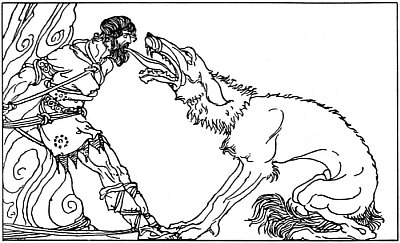
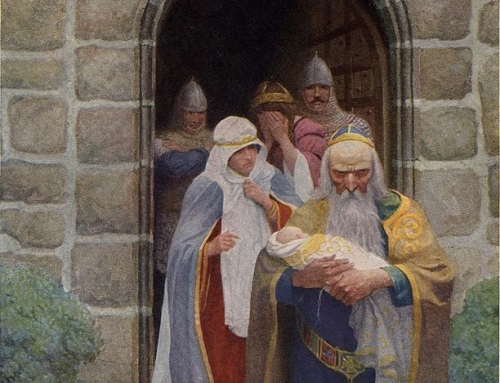
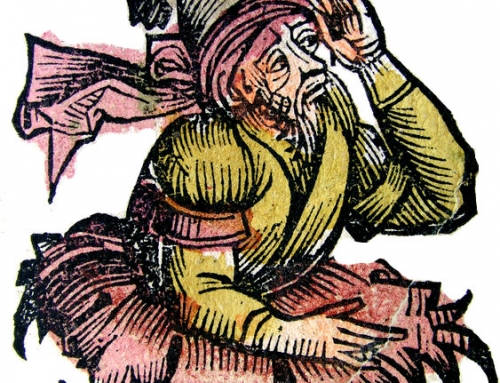

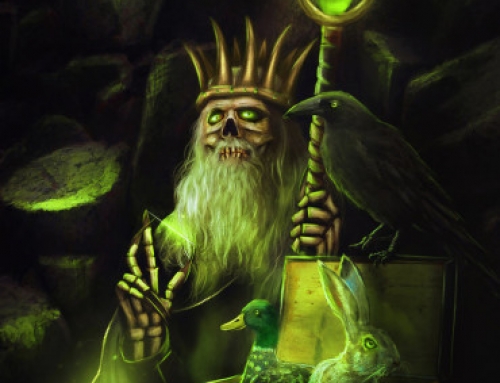
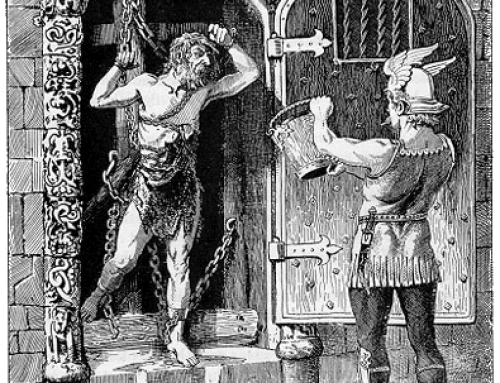
Leave A Comment